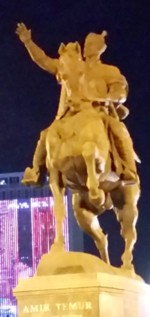Travels in Central Asia
In June 2018 we travelled to China before joining an organised tour in Central Asia that, except for a sojourn in the mountains of Tajikistan, followed in the footsteps of Marco Polo along the Great Silk Road.
The Silk Road
The term ‘silk road’ was first coined by a 19th century German historian and has stuck ever since to a series of somewhat flexible overland routes across Eurasia extending 11,000 km (7,000 m), a third of the way around the world, from Xi'an in China to the Mediterranean Sea. It linked on en route to the other great trade route that went to India, through modern Pakistan from Afghanistan, via one of five 'invasion routes' that included the Khyber pass and up the Kabul River valley, that rises very close to the upper reaches of the Indus near Rawalpindi (and modern Islamabad). Today this whole network is called the Great Silk Road.
The ancient silk road is by far the longest and oldest overland trade route in the world. Chinese silk has been found in the hair of Egyptian mummies that were embalmed around three thousand years ago, arriving there by some arcane series of trades. But by Roman times, trade along the Silk Road was more organised, as the Roman historian Pliny wrote: 'so Roman women may expose their charms through transparent cloth'. At that time (c 78 CE) the very long lived Han Dynasty ruled China and China's military and trade influence extended as far as Transoxiana, the region between the Amu Darya and the Syr Darya rivers that run into the Aral Sea, now mostly in Uzbekistan, while the Roman Empire extended to a port on the Caspian sea, just a thousand kilometres away, less than the distance from Melbourne to Brisbane or New York to Charleston or John o' Groats to Land's End.
Under the Tang Dynasty Transoxiana would briefly become Chinese territory but in 751 CE it would fall to the Arabs with the assistance of the Mongol Empire, ending Chinese expansion west for the next 1,200 years.
Trade with the west grew in the 13th century after Genghis Khan followed by his son, Ögedei Khan, conquered Central Asia (including Tibet) and China in addition to: Eastern Turkey, Belarus and most of Russia, part of Romania, all of Iran and Eastern Iraq (Persia). Thus creating the largest contiguous land Empire the world has ever seen. Yet, hidden behind the veil of that great and feared Mongol Empire the existence of China was almost forgotten by medieval Europe, so that many believed that silk originated in India.
But hidden knowledge was bread and butter to Venetian traders, like the family of Marco Polo. Between 1271 and 1295 this young man, travelling with his father and uncle, followed the silk trade all the way to China. After his return he was taken as a prisoner of war by Genoa, where he related his experiences to Rustichello da Pisa who was amazed and wrote them down, publishing them as the Travels of Marco Polo, around 1300. They found an equally amazed and incredulous European audience particularly at/by the young man's experiences at the court of Kublai Khan, who as we will see later, was one of Great Khan’s grandsons, now at the head of the Yuan Dynasty.
It was Kublai Khan who had commanded the systematic mapping of towns along the Silk Road to facilitate trade, connecting the far flung reaches of the Mongol empire with commerce and information along which the traders travelled.
But it was the Travels of Marco Polo that are credited by some historians with kicking off the European Renaissance and the collapse of monasticism, leading to the Scientific Revolution and the modern world.
The Travels also inspired Samuel Taylor Coleridge, assisted by opium, to write a famous poem by which the name Kublai Khan is perhaps best remembered:
Kubla KhanOr a Vision in a Dream. A Fragment In Xanadu did Kubla Khan Samuel Taylor Coleridge, 1772 - 1834 |
The opium poppy (papaver somniferum) would in time play its part in both the devastation and the development of China and latterly of Central Asia, particularly Afghanistan. In the 19th century the Chinese would attempt to stop the British East India Company trading in Indian grown opium for Chinese manufactured domestic goods and silver, draining the Imperial Treasury, and a century and a half later the US and her allies would attempt to stop cultivation in Afghanistan.
Oddly, in the 21st century the largest supplier of legal, medical, opium in the world with 85% of the market is Tasmania, Australia.
Today China's President Xi Jinping is keen to revive the Great Silk Road with a special eye to oil and gas reserves in Central Asia. In 2013, he unveiled his 'One Belt, One Road' (OBOR) initiative, also known as the 'New Silk Road', to invest in transport infrastructure all the way to Europe.
Pakistan has already been promised an initial $50 billion to develop the China-Pakistan Economic Corridor (CPEC). India has declined to participate but 65 other countries have expressed interest and the European Union has set up the 'EU-China Connectivity Platform' to coordinate the European response. As we learned on this trip, like Pakistan, both Tajikistan and Uzbekistan, along with several other 'Stans', are already in receipt of substantial Chinese infrastructure assistance.
The New Silk Road - following the old - as envisioned in Uzbekistan
Xi Jinping has a grander scheme in mind - projecting China's influence across Eurasia to the EU
As have our travels elsewhere, this trip would again challenge a number of the simplistic assumptions with which I grew up. As this website suggests, despite my inevitable prejudices and unfounded assumptions I try to apply a sceptical filter, taking nothing for granted, and to: ...weigh everything.

